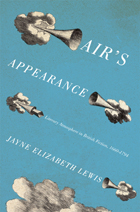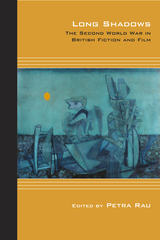3 books about British Fiction

Air's Appearance
Literary Atmosphere in British Fiction, 1660-1794
Jayne Elizabeth Lewis
University of Chicago Press, 2012
In Air’s Appearance, Jayne Elizabeth Lewis enlists her readers in pursuit of the elusive concept of atmosphere in literary works. She shows how diverse conceptions of air in the eighteenth century converged in British fiction, producing the modern literary sense of atmosphere and moving novelists to explore the threshold between material and immaterial worlds.
[more]

Death Sentences
Styles of Dying in British Fiction
Garrett Stewart
Harvard University Press, 1984
Whether as a theme, scene, or sentence, the representation of death provides a unique critical leverage on the workings of the post-Romantic novel, as Garett Stewart demonstrates in this study of over forty major texts. Through close stylistic analysis Stewart examines death as a pivotal moment for language on the edge of silence, for narrative on the brink of closure. Chapters ranging from Dickens and other Victorian novelists through Joseph Conrad and E. M. Forster to D. H. Lawrence and Virginia Woolf offer revisionist readings of exemplary texts. The study concludes with discussion of the postmodernist treatment of death in the novels of Beckett and Nabokov. In the course of these discerning readings, informed by theoretical work from Freud to Walter Benjamin, Marurice Blanchot, and Roland Barthes, Stewart demonstrates that the Victorian death scene is less sentimental and formulaic than has usually been assumed; he thus argues for a fertile continuity from the nineteenth-century novel to its twentieth-century experimental progeny.
[more]

Long Shadows
The Second World War in British Fiction and Film
Edited by Petra Rau
Northwestern University Press, 2016
Few countries attribute as much importance to the Second World War and its memory as Britain; arguably nowhere else has this conflict developed such longevity in cultural memory and retained such presence in contemporary culture. Long Shadows is about how literature and film have helped shape this process in Britain. More precisely, the essays collected here suggest that this is a continuous work in progress, subject to transgenerational revisions, political expediencies, commercial considerations, and the vicissitudes of popular taste. It would indeed be more accurate to speak of the meanings (plural) that the war has been given at various moments in British cultural life. These semantic variations and fluctuations in cultural import are rooted in the specificity of the British war experience, in the political aftermath of the war in Europe, and in its significance for Britain’s postwar position on the global stage. In other words, the books and films discussed in these essays respond to how the war has been interpreted and remembered; what is at stake is the way in which the war has been emplotted as a hegemonic cultural narrative about Britain.
[more]
READERS
Browse our collection.
PUBLISHERS
See BiblioVault's publisher services.
STUDENT SERVICES
Files for college accessibility offices.
UChicago Accessibility Resources
home | accessibility | search | about | contact us
BiblioVault ® 2001 - 2024
The University of Chicago Press









